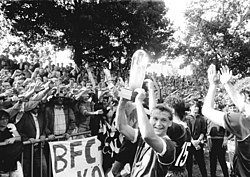| East German Supercup | |||||||
|---|---|---|---|---|---|---|---|
 BFC Dynamo celebrate winning the DFV-Supercup in 1989 with Heiko Bonan holding the trophy. | |||||||
| |||||||
| Date | 5 August 1989 | ||||||
| Venue | Stadion der Freundschaft, Cottbus | ||||||
| Referee | Klaus-Dieter Stenzel (Forst) | ||||||
| Attendance | 22,347 | ||||||
The DFV-Supercup (also known as Pokal des Deutschen Sportechos ) [1] was the super cup of East German football, played between the winners of the DDR-Oberliga and the FDGB-Pokal.

